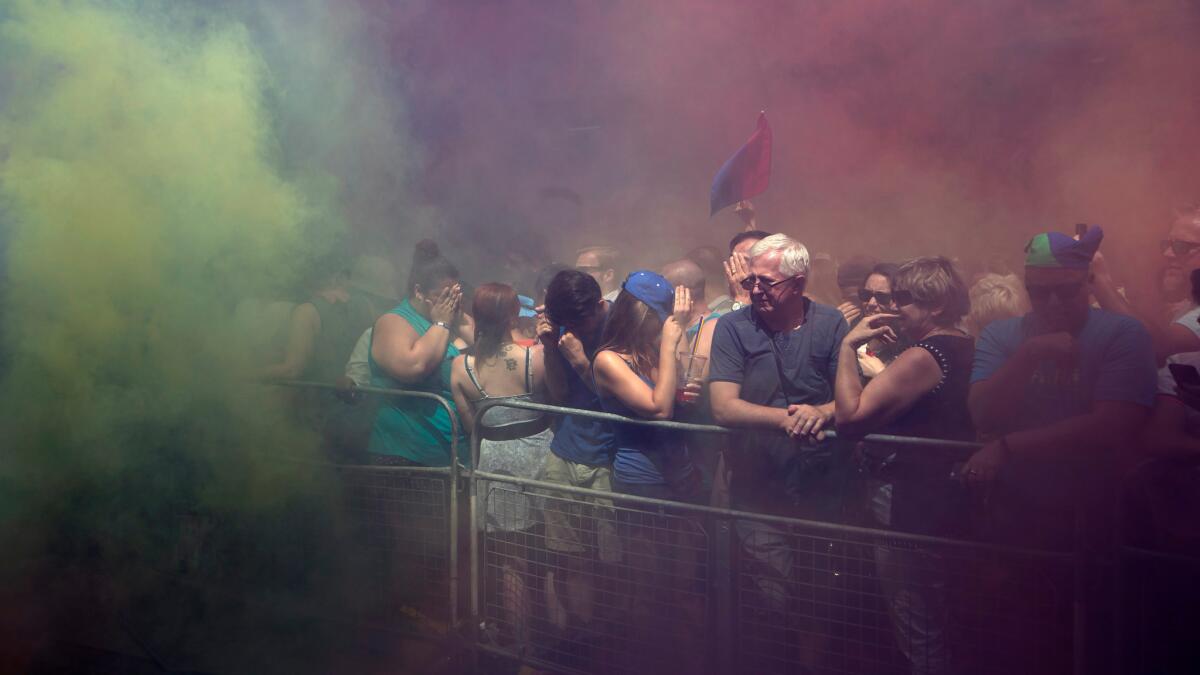Op-Ed: Politics on parade: How Black Lives Matter halted a gay pride parade in Toronto

On Sunday, Black Lives Matter activists pulled off the sort of victory that right-wing hooligans could only hope to achieve: They stopped a gay pride parade.
“We are calling you out!” Alexandria Williams, co-founder of the group’s Toronto chapter, shouted through a megaphone as the Black Lives Matter float came to a halt and marchers sat down. Amid rainbow-colored smoke bombs, she accused event organizers of harboring “a historical and current culture of anti-blackness” — a curious claim considering how the festival welcomed Black Lives Matter as “guests of honor.”
Black Lives Matter refused to budge unless pride organizers acquiesced to a list of demands, which included increased funding for black-related pride events, “prioritizing black trans women” in hiring, and “a commitment to more black deaf & hearing ASL interpreters.” Surely, these issues — which are always “demands,” never “requests” — could have been taken up in a constructive manner before the parade. But dialogue has never been the preferred mode of communication for Black Lives Matter, not even, apparently, in uber-polite Canada.
It took only 30 minutes for festival organizers to surrender to this bullying. Gay rights activists are adept at challenging authority. Beginning with the very act of coming out, gay liberation’s whole gestalt is defiance. That’s easy to do when it comes to a government denying you basic equality. When their interlocutors are people claiming to be more oppressed, however, gay progressives are at a loss. Out-radicalized, they’re utterly helpless.
The Toronto activists’ list of demands mostly consisted of the usual progressive calls for money gussied up in the language of “social justice.” More objectionable, however, was Black Lives Matter’s insistence upon the “removal” of police floats and booths from future gay pride events.
A week earlier in San Francisco, Black Lives Matter pulled out as the organizational grand marshal of the city’s pride parade. Why? Too many police there to protect the event. Of course, the impetus for that increased police presence was the massacre of 49 people at an Orlando, Fla., gay nightclub by a terrorist pledging fealty to Islamic State. But to some activists, that’s no reason for having police guard gay venues. “A real safety plan would have been attacking homophobia at its root,” San Francisco BLM spokesperson Malkia Cyril told the San Francisco Chronicle. Presumably Cyril didn’t mean sending the Marines to Raqqah, Syria.
Perhaps now that they’ve largely won legal equality, gay rights groups feel comfortable affiliating with radical outfits such as Black Lives Matter.
The chutzpah here is contemptible. Gay groups honored Black Lives Matter with prominent roles at their pride events, and Black Lives Matter returned the favor by hijacking those events to further their own anti-cop agendas. Condemning the police as an inherently racist, homophobic institution is not only false and counterproductive, it denigrates the many LGBT officers whose participation in these festivities would be annulled if the activists got their way. “The support that I have from my peers and supervisors has been unwavering,” gay Toronto policeman Chuck Krangle wrote in an open letter after the parade flap. “Police officers are significantly represented in the LGBTQ community and it would be unacceptable to alienate and discriminate against them and those who support them.” (The chief of Toronto’s police department, for what it’s worth, is black, a fact I recognize will be utterly lost on BLM activists.)
Defenders of Black Lives Matter insist that the gay rights movement was birthed in protest against police harassment at Stonewall, and in Canada, amid riots triggered by raids on a gay bathhouse. Gay people, thus, should indulge BLM in its anti-police agitation. But invoking Stonewall and similar episodes of historic police abuse only shows how far our two countries have come. In so many places around the world — Russia, and, most recently, Turkey — the police attack pride parades and arrest gay rights activists. In North America, police protect them.
The various parade shenanigans weren’t the only attempts by hard-left activists to divert attention to an extraneous cause. At a vigil ostensibly convened to remember the victims of the Orlando mass shooting, an activist at the University of Missouri declared that she was “really nervous to get up here because there’s a lot of white people in the crowd.” She then proceeded to hector the mourners for not participating in “our racial demonstrations and our Black Lives Matter movement.” Similarly, gun control advocates have exploited the Orlando attack by enlisting gay rights organizations in their cause, ignorant or heedless of the possibility that many gay people might disagree with their aims.
Perhaps now that they’ve largely won legal equality, gay rights groups feel comfortable affiliating with radical outfits such as Black Lives Matter. But such ideological promiscuity comes with a cost. It’s one thing to stand against police brutality. It’s another to denigrate an entire city’s police force as the reincarnation of Bull Connor. Gay people must ask themselves: Do they really want to be implicated with a movement that views the very concept of law enforcement as a racist conspiracy?
James Kirchick is filling in for Doyle McManus. He is a fellow with the Foreign Policy Initiative. Follow him on Twitter @jkirchick.
Follow the Opinion section on Twitter @latimesopinion or Facebook
MORE FROM OPINION
Boycotts of Israel are a protected form of free speech
Ending the military’s transgender ban will have far more impact than you might think. Here’s why.
More to Read
A cure for the common opinion
Get thought-provoking perspectives with our weekly newsletter.
You may occasionally receive promotional content from the Los Angeles Times.






